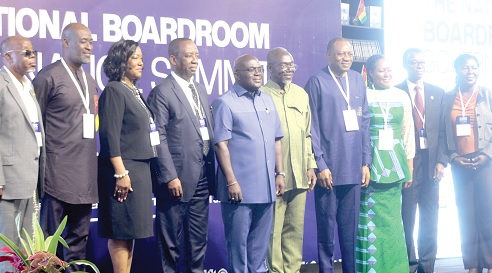The Chief of Staff, Julius Debrah, has said that prioritising ethical governance will enable the country to fully leverage opportunities presented by the African Continental Free Trade Area (AfCFTA).
He said the opportunity of hosting the secretariat would only bear fruit through good governance that emphasised trust, quality and compliance, and sustainable growth.
“Ethical governance is not just a regulatory requirement but a foundational element that enables countries such as Ghana to maximise the benefits of AfCFTA to foster economic growth and stability.
“For Ghanaian businesses, AfCFTA benefits depend on boardrooms that prioritise export readiness, product quality and risk management.
“Boards must set clear compliance policies, align with continental standards and monitor ethical border transactions. When Ghana's boardrooms govern ethically, they not only expand national trade, but also define Africa's example for responsible capitalism,” Mr Debrah added.
Event
The Chief of Staff was speaking at the second national boardroom governance summit in Accra yesterday, on the theme: “Daring to be different: The role of the chairperson in effective boardroom governance.”
Present at the summit were the Minister of Employment and Labour Relations, Dr Abdul-Rashid Hassan Pelpuo; the Minister for the Interior, Muntaka Mohammed-Mubarak; the Deputy Comptroller-General of the Ghana Immigration Service, Laud Ofori Afrifa, and Justice Senyo Dzamefe, a Justice of the Supreme Court, among others.
The summit, which was convened by Professor Douglas Boateng, was also attended by CEOs, board chairs, directors, and governance professionals from across the country and beyond.
The event sought to provide actionable insights on accountability, transparency and leadership, which are considered key ingredients in building resilient organisations and sustainable economies.
It featured sessions which explored how chairpersons could drive strategic transformation, strengthen board effectiveness, and inspire management teams to embrace innovation while safeguarding stakeholder trust.
Role
On the crucial role of boardroom governance, Mr Debrah said that every major economic outcome, whether in mining, energy, banking, infrastructure or state enterprise, began quietly at the boardroom table.
He said the boardroom table was not just a meeting place, but the country's first decision arena, adding, “Some boardroom governance determines whether strategy becomes success or another shared ambition”.
As a result, the Chief of Staff said it was important for boards to be transparent, accountable and operate professionally to ensure confident capital, multiplication of jobs and resilience.
Touching on the government’s 24-hour Economy agenda, he said the policy was not only about extending working hours, but gathering time, talent and technology with precision and purpose.
Mr Debrah said for Ghana to sustain such an economic policy, boards needed to be disciplined enough to plan beyond quarterly cycles and link operational efficiency to governance accountability.
Transformation
Prof. Boateng stressed the need for transformative leadership among chairpersons and board members across Africa.
He said that despite the critical role board leaders played in shaping the future of establishments, they were mostly undervalued.
“When we starve governance, we feed waste," Prof. Boateng said, and advocated a compensation structure that reflected the responsibilities and risks taken by board leaders.
He also observed that quarterly meetings were not sufficient for boards to operate efficiently.
Instead, Prof. Boateng said such meetings should be held monthly to effectively track results.
“This will also help to identify issues very quickly for the right decisions to be made. The old way of meeting quarterly doesn’t work,” he added.
Prof. Boateng further called for the appointment of board chairpersons every six years instead of four years to ensure proper transition.

